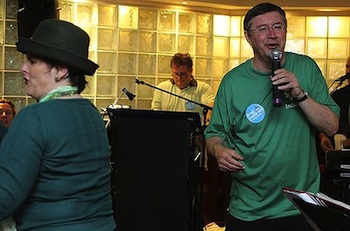Watch your steps
 Polly Peck •
Polly Peck •  Friday, August 26, 2011
Friday, August 26, 2011 While the Commonwealth's "genuine steps" pre-litigation requirements had a healthy birth at the beginning of the month, NSW's "reasonable steps" were strangled before they drew breath ... NSW government calls sniffer dog off the DPP's patch ... Last days of lump-sum cash for victims of crime
 Just as the Commonwealth's Civil Dispute Resolution Act gets underway, the NSW government has shut down the dispute resolution component of the Civil Procedure Act.
Just as the Commonwealth's Civil Dispute Resolution Act gets underway, the NSW government has shut down the dispute resolution component of the Civil Procedure Act.
The explanation advanced by the state government is gossamer thin.
NSW Attorney General Greg Smith says that "a large number of lawyers and clients" already take reasonable steps to resolve disputes before resorting to litigation.
"The new laws were designed to encourage the remainder to do the same."
The legislation was introduced by Labor and supported at the time by the Coalition.
However, Smif now says that since the law was passed last year, "concerns have been raised by a number of key stakeholders that the provisions may have unintended consequences".
Who are these "key stakeholders" and are their concerns more to do with self-interest than public-interest? It remains a mystery - but someone has been putting in their oar to kill off the "reasonable steps" provisions of Labor's legislation.
Consequently, the October 1 starting date for the reasonable steps requirement (Part 2A of the Civil Procedure Act) will be postponed for 18 months - beyond that nothing is certain. Smif says:
"The NSW government will ultimately make informed decisions about the future of of Part 2A, using all the available evidence."
He did not mention his concerns at the time he supported passage of the Bill last year.
The idea now is to watch and see how the Commonwealth's required "genuine steps statements" pan out. The Civil Dispute Resolution Act (Cth) 2011 commenced on August 1.
Smif flagged all this in his pep talk to the bar's ADR workshop on August 13.
The AG suggested that far from reducing the demand on court resources by encouraging early resolution, the NSW legislation may actually increase litigation.
People have been getting into his ear with the idea that Part 2A is an "intrusion into professional judgments about whether, or when, or in what manner a party should explore consensual resolution of a dispute".
"More importantly, however, concerns have been raised that the legislation has the potential to lead to a new battleground for dispute. A battleground for dispute about whether parties have acted 'reasonably', under pain of cost penalty. This is the so-called 'satellite litigation' phenomenon."
The "satellite litigation" phenomenon has not seen requirements for pre-mediation in other common law countries cruelly skewered before taking breath.
It sounds like the argument advanced by the bar whenever the immunity from suit looks like escaping for the cupboard.
In England, where the barristers' immunity was scrapped, the feared rise of "satellite litigation" just didn't materialise.
The NSW bar 'n' grill denies making submissions to the government on the reasonable steps provisions.
The Law 'n' Order Society might have been more active behind the scenes, saying it "welcomes the decision by the Attorney General".
"The Law Society's litigation law and practice committee has identified some areas of uncertainty in how the pre-action requirements would operate and an evaluation of the federal requirements may allow these to be clarified so that any unintended consequences in the legislation are avoided."
Commonwealth AG Robert McClelland, in a letter he sent to The Sydney Morning Herald on August 7, said his genuine steps requirements, "will save time, costs and stress for all parties". He denied it will create "two rounds with lawyers instead of one".
Satellite litigation got a good airing by the NSW Court of Appeal in Lemoto v Able Technical Pty Ltd where what constituted reasonable pre-litigation steps received attention.
 Smith told the bar's ADR workshop:
Smith told the bar's ADR workshop:
"I would only suggest that you watch this space for developments in the next week. It may be that it would be better to see how the Federal Court handles the transition."
Sure enough, on August 23 he announced that this inspiration for "satellite litigation" would stay on the shelf for a while longer.
In John Buchan's The Thirty-Nine Steps, later a Hitchcock film, the steps were a mystery until it was revealed in the last reel that they were an organisation of spies collecting information on behalf of the state.
We can only hope the mystery about Smif's jettisoned reasonable steps can emerge with as exciting a flourish.
* * *
Another bold legal initiative of the former regime in NSW has also been flushed down the pan by the Libs.
The previous attorney general, John Hatzistergos, in his tireless war against the DPP, got legislation through that reduced the retirement age of new crown prosecutors to 65 and for any future DPP from life to 72.
Greg Smif is putting through legislation that shifts the retirement age for prosecutors and public defenders back to 72, keeping them in line with judges.
 Smith: wants to extend the life of talent at the crown law officesAs a former prosecutor, the AG would have a deep appreciation of Hatzistergos' insult to the crown law officers. It had to be remedied, and fast.
Smith: wants to extend the life of talent at the crown law officesAs a former prosecutor, the AG would have a deep appreciation of Hatzistergos' insult to the crown law officers. It had to be remedied, and fast.
The legislation applies to the deputy director of public prosecutions, the solicitor for public prosecutions, senior crown prosecutors, deputy crown prosecutors, crown prosecutors, senior public defenders and public defenders.
The new compulsory retirement age will affect those appointed since November 1, 2007. The length of their careers can be boosted by up to seven years.
Smif explained:
"The NSW government does not want to see talented crown prosecutors and public defenders forced into retirement prematurely when they are mentally sharp and still have a great deal to offer the NSW justice system."
Of course, old appointees, such as senior public prosecutor Mark Tedeschi, remain in the saddle as lifers.
When the 2007 amendments were introduced it emerged during the debate that very few prosecutors or defenders actually worked after they reached 65 years of age.
Those who did could do so by way of temporary appointments.
Indeed, it seems the current amendment has much to do with symbolism, because the number of crown law officers likely to extend the span of their careers is expected to be tiny.
One important change is that the government intends to dismantle what was designed by Hatzistergos to be his on-the-spot spy within the office of the DPP.
The executive director of the ODPP will no longer be required to report directly to the AG, only to the DPP.
Smif said this will "increase the independence of the ODPP".
* * *
Looks like the NSW victims compensation scheme is up for a good rogering.
Smif told parliament on August 11 that he was initiating an assessment of the victims compensation fund, which would then morph into a review of "the long term viability and parameters of the scheme".
Once a report has been prepared by external consultants engaged for the assessment and review a report will go to a steering group with wallahs from AGs, Premier and Cabinet and Treasury.
Sometime after that a new policy will emerge, but if the figures are any guide the writing is on the wall.
What with so many victims around by 2014-2015 the contingent liabilities of the fund will be $414 million with 33,666 claims pending.
As things stand now the contingent liability of the fund is over $220 million.
What we're seeing is a boom industry. Over the last five years claims have surged 83 percent, from 5,054 to 9,245 in 2009-2010.
The backlog has increased in the same period from 6,246 cases to 18,030.
The whole enterprise is unsustainable on the dribs and drabs of money from restitution paid by offenders and amounts siphoned from the criminal assets recovery regime.
In other words, the future of the money side of victims' compo scheme is in dire strife.
Smif hinted that the lump-sum payments might soon be a thing of the past:
"The NSW government wants the scheme to provide prompt and practical support to victims rather than being a drawn out process that delivers lump-sum payments to people long after their injuries have been treated."
Pounds to peanuts "an alternative" scheme will roll off the production mill, providing lots of "support and rehabilitation services".
Farewell lumps of cold hard cash.
 ADR,
ADR,  Greg Smith
Greg Smith 









Reader Comments (1)
No NSW Government has yet explained how individuals who were described as "liars" and "whose evidence I cannot accept" by Justice David Levine (as he then was) in the 2000 Marsden defamation trial on the civil standard received victims compensation also on the civil standard. But then again perhaps I have it all wrong and the "civil standard" means different things in NSW to different judicial officers. Perhaps some of them went back in time in Dr Who's Tardis and visited the Tudor Star Chamber. After all, who needs "fairness", "due process" or The Rule of Law, as we have recently seen with Federal Minister Morrrison and his Maritime legislation. Lets be honest and admit that such time-honored legal doctrines just get in the way of Government and they like Charters of Rights are nothing but a damn nuisance.